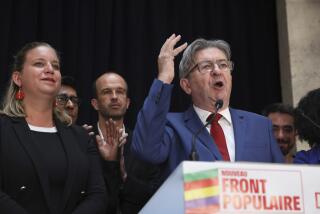NEWS ANALYSIS : Polish Politicians âAfraid to Wake Upâ : Elections: The splintered results also leave a legacy of dismay for the voters.
WARSAW â President Lech Walesa noted that his nationâs politicians were difficult to reach by telephone Monday morning. They had gone through a rough night.
âThey are sleeping,â Walesa said. âThey are afraid to wake up.â
The politicians had considerable company among Poles who found the results of Sundayâs parliamentary elections dismaying and troubling.
In the first fully free parliamentary elections since the beginning of the Communist era in 1947, the only clear triumph in the vote was scored by two parties historically tied to the Communists. Those two parties finished in second and third place and between them will hold about 97 seats in the Parliament, 21% of the 460 seats.
By far the majority of votes in the election went to distinctly non-Communist parties, most of them rooted in the Solidarity opposition movement. But this 57% share was split among seven parties, with the strongest among them pulling only 12.8% of the vote.
That percentage was claimed by the liberal-left Democratic Union party of former Solidarity Prime Minister Tadeusz Mazowiecki. The âLeft Alternativeâ grouping led by the Social Democracy of the Republic of Poland, formed from the shards of the now-defunct Communists, was only a percentage point behind, claiming 11.6%--second place in the overall voting.
The result was being read virtually universally by political analysts here as a signal that Polandâs full-speed-ahead economic reform policies, which have brought widespread international approval and mounting complaints at home, are likely to be sharply braked.
Clearly depressed by the outcome of the vote, Prime Minister Jan Krzysztof Bielecki, whose policies have been aimed at a continuation of the âshock therapyâ economic reforms launched nearly two years ago, described the election as partly âa vote against the market economy.â He described himself glumly as âa person who can say that his policies have met with the antipathy of society.â
Bieleckiâs party, the Liberal Democratic Congress, finished in seventh place in the voting, garnering only 7.1% of the vote.
Walesa, who had indicated before the election that Bielecki was his choice to continue as prime minister, now will be forced to come up with another candidate to be approved by the Parliament. Walesaâs office said Monday that the government probably will be formed from a âbroad base of post-Solidarity groups.â
But this task could take days, given the fractious nature of Polish politics generally and the divisions within the old Solidarity camp, whose groupings are spread widely across the political spectrum.
The splintered vote was widely attributed to the rules established before the election, which allowed virtually all comers into the balloting. More than 7,000 candidates competed, with more than 100 parties and about 20 coalition groupings.
About 18% of the Parliament will be made up of small splinter parties. The Friends of Beer Party wound up with 3.1% of the vote and will have two or three representatives in the Parliament. In total, 19 parties will be represented,
Another factor in the outcome was the low turnout, with only 40% of 27 million voters casting ballots.
Mazowiecki, who resigned as premier after coming in a poor third in last yearâs presidential election, said Sunday that he is prepared to build a coalition of all pro-Solidarity groups. Mazowiecki has indicated he would be interested in another term as prime minister.
But even top members of his party said this would be hard. âThere is always a possibility of creating a government, but it will be a very difficult task,â said Piotr Nowina-Konopka, secretary general of the Democratic Union.
One possible candidate could be historian Bronislaw Geremek, formerly leader of the Solidarity grouping in the Parliament and a member of Mazowieckiâs Democratic Union party.
Geremek has had his differences with Walesa in the last two years, but he is regarded as a smooth tactician and skilled political operative who might be capable of bridging differences between the left and right wings of the post-Solidarity parties.
More to Read
Sign up for Essential California
The most important California stories and recommendations in your inbox every morning.
You may occasionally receive promotional content from the Los Angeles Times.










